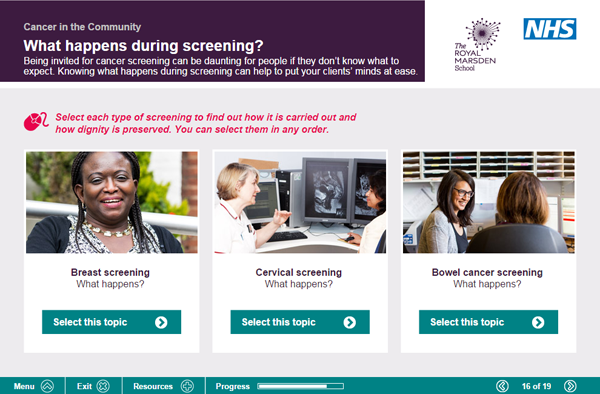Free eLearning to Support Cancer Care in the Community
Plymouth (UK), March 2016 - A free eLearning programme is being launched to help health and social care workers broaden their knowledge of cancer care in the community. The Royal Marsden School, which has a national and international reputation for excellence in cancer education, has commissioned eLearning provider Sponge UK to create the new healthcare training.
The eLearning course is made up of four modules on cancer prevention and screening, diagnosis and staging, treatments, and living with and beyond cancer.
The training includes personalisation features to help professionals tailor the training to their specific needs and experience.
Louise Pasterfield, Managing Director, Sponge UK said, “It has been a privilege to work with one of leading specialist cancer schools to create this open-access eLearning programme to support cancer care in the community and help improve the lives of cancer survivors. Using intelligent design, we have been able to create eLearning that works for a broad range of professionals, with video and animation to emphasise key areas and ‘deeper dive’ resources for those who want to know more on a particular topic.”
The eLearning course is suitable for all qualified and non-qualified community-based health and social care workers, including community matrons, nursing staff, physiotherapists, occupational therapists, speech and language therapists, dieticians, and support workers who meet patients with cancer.
The materials have been written by clinical specialists and experts at The Royal Marsden and include real-life scenarios and engaging video clips to help bring the subject matter to life.
Evidence shows that many cancer patients have unmet needs, particularly at the end of treatment, whilst others are struggling with consequences that could be either avoided or managed.
The new eLearning programme is aimed at helping to plug the gap and broaden education and support for community health and social care workers who work with cancer patients.









